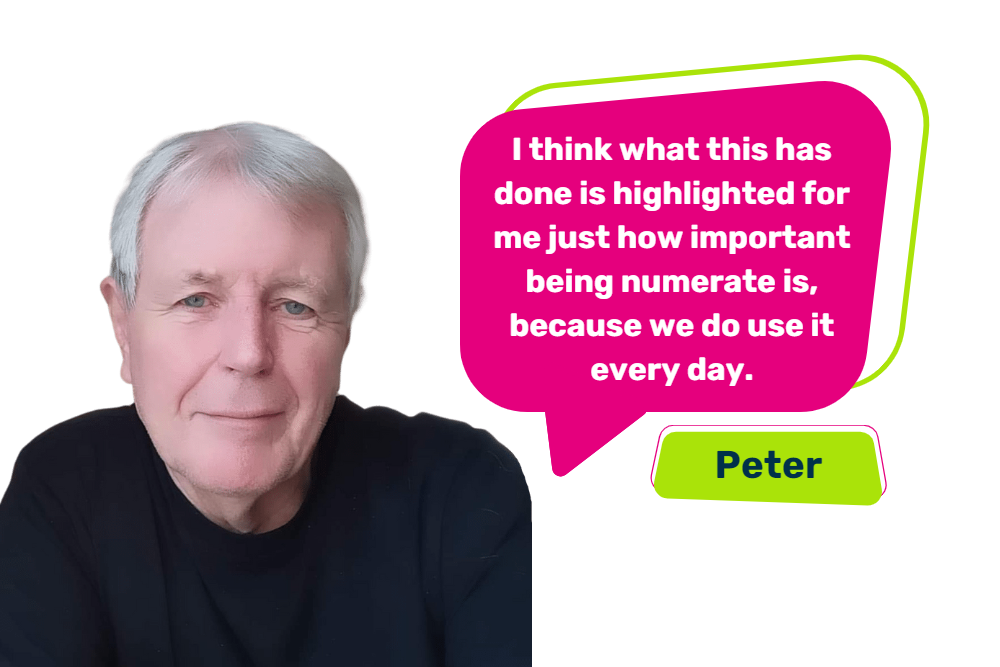“I think the trouble was I wasn't actually brilliant at school. I was always struggling with a number of subjects – subjects I loved, but just couldn't get my head around. Maths was a big black hole for me. I think the problem was that the class was about 35 students, and if you didn’t understand something then often the teacher didn’t have time for you. You just managed the best you could.
"My father, who was an engineer, helped me enormously – he even bought the schoolbooks that we were using. When I had homework, he would help me understand what was going on. I was able to ask the questions that I wasn't getting answered at school.
"I think with numeracy through my life, I've learned a lot more since I left school. People look at certain subjects and think “When am I ever going to use that?” but it does come into our lives every single day. Sometimes you don't even realise it. I worked in design for most of my professional life, and that involved all kinds of maths. You’ve got to work out how many times a particular design is going to fit into a piece of material so that you’re getting the best out of it. You're working with measurements, with areas.
"When you look at everyday life, you go to the shops and have to work out what’s the best value. They give you comparative prices per 100g or per 100ml, but you still have to think through the process of, 'If I get two of the big one, is that actually cheaper than four of the small ones?' You go to a petrol pump and think, 'Am I paying more at this petrol station than somewhere else?' You're working these things out in your head all the time. It’s important.
"I came across the National Numeracy Challenge on my news feed, and I thought, 'That looks interesting and it's giving you a challenge... I'm going to have a go and see how I do.' It was purely just an opportunity to see whether or not I could face that challenge. The questions were applied maths, and you've actually got to then work out what it's asking you to achieve. Most of our maths at school was based on arithmetic, algebra, calculus and geometry and so on, whereas the questions here are much more based on real things; 'If so-and-so is doing this, and does that five times, but it happens twice every so often, how many times does it happen in a year?' You’ve got to see what the formula is that's required to get to the answer, rather than just being given a formula and finding the answer to that formula.
"I’ve now got the Essentials of Numeracy certificate in my work room. That feeling of achievement, and having the certificate, that's the whole point, isn't it? Because how do you prove to somebody that you have an ability if you haven't got some recognised element for it?
After doing the Challenge I feel quite confident in whatever I'm doing; if there's anything that I know that I'm being challenged with I'll look into it and see what’s missing in my knowledge.
"I also feel comfortable controlling my money and accounts. This is really important because there's only so much money coming in and there's a lot going out. I’m working out what I've got, projecting what I think I'm going to need, and reconciling my bank account with what I'm spending. At one point I decided to employ an accountant, but it didn’t work out, and I ended being taxed far more than I’d expected. So ever since that I've done all my own work, done all my own books, and it works out perfectly fine. I know exactly where I am and feel confident!
"And I’m now able to help friends and colleagues with their everyday maths too. Since I've retired one of the things that I've been doing is not only DIY at home, but also offering myself as a small business to help people who want small jobs done and perhaps a professional builder is going to be too expensive. A friend of mine has been doing building renovation work for most of his life, and we've talked about various jobs. When he's been faced with an issue which relates to quantities, measurements, areas and so on, he's often asked me how to work it out – and I’ve been able to help him. I've given him some simple ideas to remember how to tackle certain things, formulas for creating areas of circles for example, and he's found it quite useful.
"Numbers are an essential part of everything we do, and even more so in a technological world. We rely now so much on technology, and technology is based on mathematics. If you want to achieve anything in the future you’re going to have to understand more and more about mathematics.
"I think what this has done is highlighted for me just how important being numerate is, because we do use it every day. I tend to not think about it, I just automatically do it. But doing the National Numeracy Challenge, and talking about it, highlights the fact that we can't live each day without being numerate.”





